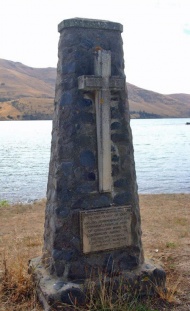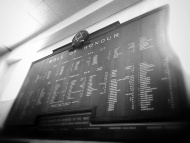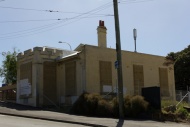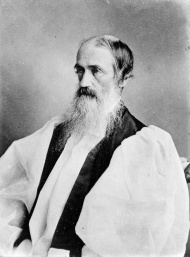Events In History
-
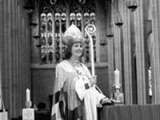 29 June 1990World's first female diocesan Anglican bishop appointed
29 June 1990World's first female diocesan Anglican bishop appointedDr Penny Jamieson, who had been ordained as a priest in 1985, became the Anglican bishop of Dunedin − the first woman in the world to hold such a position. She retired in 2004. Read more...
-
 29 March 1959Evangelist Billy Graham arrives for 11-day crusade
29 March 1959Evangelist Billy Graham arrives for 11-day crusadeIn the first half of 1959 Billy Graham and his associate evangelists Leighton Ford, Grady Wilson and Joseph Blinco held crusades in New Zealand and Australia which attracted large audiences. Read more...
-
 20 April 1958Mormon temple opens in Hamilton
20 April 1958Mormon temple opens in HamiltonThis was the first temple of The Church of Jesus Christ of Latter-day Saints in the southern hemisphere. Read more...
-
 17 May 1922Catholic Bishop found not guilty of sedition
17 May 1922Catholic Bishop found not guilty of seditionJames Liston, the assistant bishop of Auckland, was found not guilty of sedition after it was alleged he had made anti-British remarks in a St Patrick’s Day address. Read more...
-
 26 December 1879Sectarian violence in Canterbury
26 December 1879Sectarian violence in CanterburyIn Christchurch, 30 Irishmen attacked an Orange procession with pick-handles, while in Timaru 150 men from Thomas O'Driscoll's Hibernian Hotel surrounded Orangemen and prevented their procession taking place. Read more...
-
 6 April 1864Pai Mārire ambush in Taranaki
6 April 1864Pai Mārire ambush in TaranakiA British patrol was ambushed by Pai Mārire warriors near Ōakura. The heads of the seven men killed were taken around the North Island by Pai Mārire disciples to encourage enlistment in the movement. Read more...
Articles
Pai Marire

Pai Marire (goodness and peace) was one of several Maori Christian faiths to emerge in the 19th century. Like many others, it was closely tied to issues of land and politics.
-
Page 2 – Te Ua Haumēne
Pai Marire disciples travelled around the North Island in the mid-1860s. Against a backdrop of war and land confiscations, the founding principle of Pai Marire was often
Premiers and Prime Ministers

From Henry Sewell in 1856 to John Key in 2010, New Zealand has had 38 prime ministers and premiers. Read biographies of the men and women who have held the top job, discover more about the role's political origins, and explore fascinating prime ministerial facts and trivia.
- Page 1 - Premiers and Prime MinistersFrom Henry Sewell in 1856 to John Key in 2010, New Zealand has had 38 prime ministers and premiers. Read biographies of the men and women who have held the top job, discover more
Māori King movement - 1860-94

King Tāwhiao's reign was dominated by the Waikato War and its fallout.
- Page 4 - RaupatuUnder the terms of the New Zealand Settlements Act 1863 the government confiscated 1.2 million acres (486,000 hectares) of Māori land in late
Anzac Day

First observed in 1916, Anzac Day - 25 April - commemorates those killed in war as well as honouring returned servicemen and women. The ceremonies that are held at war memorials across the country, or in places overseas where New Zealanders gather, are rich in tradition and ritual.
-
Page 6 – Another war and peace
Anzac Day came to have a wider focus and the commemorations became more popular in the years after the Second World War.
Armistice Day

After four terrible years, the First World War finally came to a close with the signing of an armistice between Germany and the Allied Powers on 11 November 1918. New Zealanders celebrated enthusiastically, despite having recently celebrated the surrenders of the three other Central Powers and the premature news of an armistice with Germany.
- Page 7 - New Zealand in 1918Some facts and stats about New Zealand in the year of the First World War
Biographies
-
 Te Whiti-o-Rongomai III, Erueti
Te Whiti-o-Rongomai III, Erueti
Te Whiti was a Taranaki leader and prophet. A resistance movement based at Parihaka was led by him and Tohu Kākahi. Te Whiti was arrested following the infamous raid on Parihaka by Armed Constabulary in 1881.
Read more... -
 Rātana, Tahupōtiki Wiremu
Rātana, Tahupōtiki Wiremu
Tahupōtiki Wiremu Rātana, of Ngāti Apa and Ngā Rauru, founded the Rātana Church, which remains a major religious and political force today.
Read more... -
 Hadfield, Octavius
Hadfield, Octavius
Octavius Hadfield, member of the Church Missionary Society, was, in 1838, the first priest to be ordained in New Zealand. He became Bishop of Wellington in 1870.
Read more... -
 Te Ua Haumēne
Te Ua Haumēne
In 1862 Te Ua Haumēne established a new religion, Hauhau based on the principle of pai marire – goodness and peace. Most settlers viewed Hauhau as a anti-European religion that became synonymous with ‘violence, fanaticism and barbarism’.
Read more... -
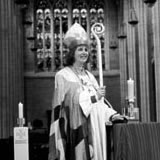 Jamieson, Penelope Ann Bansall
Jamieson, Penelope Ann Bansall
English-born New Zealander Penny Jamieson was the first woman in the world to be ordained a diocesan bishop of the Anglican Church
Read more... -
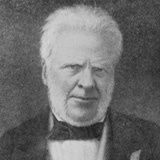 Cargill, William Walter
Cargill, William Walter
Often seen out in his blue bonnet and tartan plaid in early colonial Dunedin, Captain William Cargill was the first leader of the Free Church of Scotland’s settlement in Dunedin.
Read more... -
 Aubert, Mary Joseph
Aubert, Mary Joseph
Suzanne Aubert – later Mary Joseph Aubert – was a Catholic nun, nurse, teacher and pioneering social worker, who sometimes had to battle church and government authorities in order to help those in need.
Read more... -
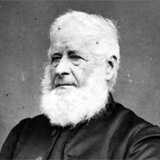 Williams, William
Williams, William
An early missionary and linguist, William Williams later came to criticise the government's dealings during the New Zealand Wars.
Read more...
Related keywords
- conscription
- conscientious objection
- WW1 home front
- cartoon
- port levy
- anglican
- wellington city
- dunedin
- church
- workers rights
- trade unions
- historic places
- christchurch
- catholic
- riots
- protestant
- missionaries
- paihia
- new zealand wars
- william williams
- christianity
- parliament
- 1970s
- children
- child welfare
- americans
- mormons
- pai marire
- race relations
- penny jamieson
- famous firsts
- scottish
- otago region
- invercargill
- william cargill
- nun
- nurses
- teacher
- social worker
- mary aubert
- crime
- james liston
- te ua haumene
- moutoa gardens
- land confiscation
- cms
- octavius hadfield
- maori land
- western front
- funerals
- passchendaele offensive
- death
- casualties
- te ati awa
- maori leaders
- prohibition
- temperance
- new zealand truth
- pussyfoot johnson
- WW1
- niue
- ottoman empire
- tahupotiki wiremu ratana
- Maori MPs
- MPs
- 1920s
- poster
- rachebites
- paraire paikea
- eruera tirikatene
- radio broadcasts
- kingitanga
- tukaroto potatau matutaera tawhiao
- treaty of waitangi
- drama
- writing
- ngaio marsh
- taranaki
- premiers
- prime ministers
- women in politics
- anzac
- gallipoli campaign
- maori in war
- WW1 stories
- ngati kahungunu
- native contingent
- pioneer battalion
- ngati apa
- nga rauru
- te reo māori
- anzac day
- protest
- public holidays
- WW2
- RSA
- influenza pandemic
- housing
- armistice
- population
- alcohol
- six oclock swill
- education
- parihaka attack
- te whiti
- te kooti
- dawn service
-
Main image: Quakers and military service cartoon
Cartoon about concerns that shirkers from military service would try to get exempted on religious grounds.


